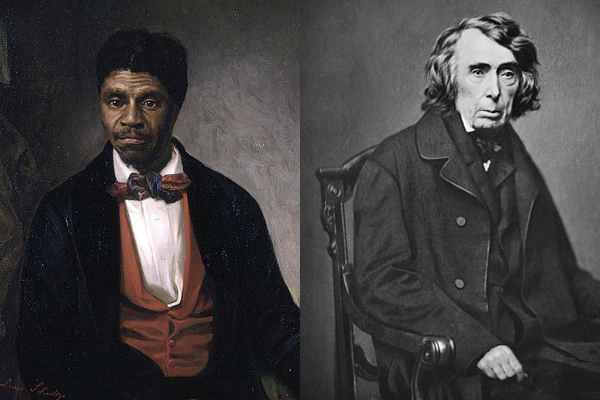
A decade later, during the nationwide grappling with racial injustice that followed the murder of George Floyd, I saw a striking Twitter discussion among professors of constitutional law, a course that I also teach. They were debating whether much of the Supreme Court case of Dred Scott v. Sandford should be excised from constitutional-law courses. In the case, which Scott brought in federal court to assert his freedom from enslavement, the Supreme Court held, in 1857, that Scott did not have the privilege to bring the suit because, as a Black person, he could not be a “citizen” within the meaning of the Constitution. Matthew Steilen, a law professor at the University at Buffalo, launched the Twitter thread and advocated for editing the case down to a minimalistic page or so, to omit text that is “so gratuitously insulting and demeaning.” He wondered whether assigning that material is asking students “to relive the humiliation of Taney’s language as evidence of his doctrine of white supremacy.”
The Dred Scott case addressed the moral and political struggle that in those years was threatening to tear the United States apart: whether slavery would be allowed in newly acquired territories. The man who enslaved Scott had taken him from Missouri, a slave state, to live in Illinois, a free state, and in a federal territory (present-day Wisconsin, Minnesota, Iowa, and parts of the Dakotas) where Congress had made slavery unlawful. Scott claimed that his stay in Illinois and the territory had emancipated him; a common-law doctrine said slaveholders who intentionally transported enslaved people into free jurisdictions freed them, regardless of intent.
The problem, though, was that, under the Constitution, in order to bring the lawsuit in the first place, one had to be a “citizen.” To arrive at the conclusion that Scott was not one, Chief Justice Roger B. Taney zeroed in on the statement in the Declaration of Independence that it was “self-evident” “that all men are created equal” and “endowed by their Creator with certain unalienable Rights.” If the Founding Fathers intended to include Black people in that declaration while personally enslaving them, Taney reasoned, that would mean that the Founding Fathers were hypocrites who “would have deserved and received universal rebuke and reprobation.” But Taney found it impossible that these “great men” acted in a manner so “utterly and flagrantly inconsistent with the principles they asserted.” So he concluded, instead, that their intent was to exclude Black people from the American political community. Of the two possibilities, grotesque hypocrisy or white supremacy, Taney found the latter far more plausible.
Indeed, Taney, a former Maryland slaveholder, said the language of equality and rights “would not in any part of the civilized world be supposed to embrace the negro race, which, by common consent, had been excluded from civilized Governments and the family of nations, and doomed to slavery.” The “unhappy black race,” he wrote, was “never thought of or spoken of except as property, and when the claims of the owner or the profit of the trader were supposed to need protection.” Most notoriously, Taney wrote that Blacks were “regarded as beings of an inferior order, and altogether unfit to associate with the white race either in social or political relations, and so far inferior that they had no rights which the white man was bound to respect.” He also noted that the Constitution itself took slavery as a given in the fugitive-slave clause, and the slave-trade clause, prohibiting Congress to abolish the “Migration or Importation of such Persons” before 1808 and allowing an import tax of up to “ten dollars for each Person.” Taney took this as evidence that the country’s founding document did not confer on Black people “the blessings of liberty, or any of the personal rights so carefully provided for the citizen.”
Scott’s case was fully resolved by the holding that he could not bring his suit, but Chief Justice Taney went even further, in a famously ill-fated attempt to protect the interests of the South and preserve the Union. Scott’s claim to have been emancipated by his stay in a free state and territory turned on the fact that Congress had prohibited slavery there, through the Missouri Compromise of 1820. Taney declared that the compromise itself was unconstitutional. According to Taney, Congress’s slavery ban violated the fundamental right of slaveholders to their property. Taney pushed a strongly anti-colonial line, insisting that slave-owning citizens who migrate to a federal territory “cannot be ruled as mere colonists” by an imperialist power. The purported imperialist here was the U.S. government imposing colonial domination by banning slavery, and the subaltern colonial subjects were slaveholders from slave states. The liberty at stake in Taney’s anti-colonial rebuke was not the freedom of enslaved people but, rather, the freedom of white men to enslave them.
News
- Deb Haaland: My Grandparents Were Stolen from their Families as Children. We Must Learn about this History
- Efforts to Restrict Teaching about Racism and Bias Have Multiplied across the U.S.
- “It’s Apartheid,” Say Former Israeli Ambassadors to South Africa
- When Monuments Go Bad
- What the Pandemic Has Stolen from Black America













